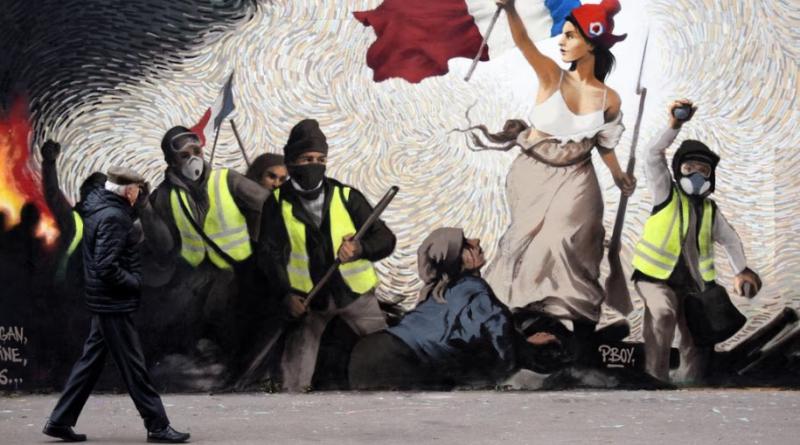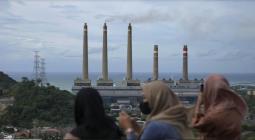Five years on, the world is failing to learn the gilets jaunes’ lesson about class and climate

From the reaction to Ulez in London to heat pumps in Germany, eco-policies are still too often felt as sanctions on working people
It began with a petition. In May 2018, Priscillia Ludosky, a gently spoken French-Martinique small-business owner who sold natural cosmetic products, launched a call on Change.org for lower prices on petrol at the pumps. It gathered steam and she was contacted by Eric Drouet, a lorry driver. Together they organised a protest against a carbon tax on petrol that was due to be implemented the following year (notably, this was not long after Emmanuel Macron cut taxes for the ultra-rich). The call was eventually answered by hundreds of thousands of people across France, in rural areas and cities. The gilets jaunes (yellow vests) movement was born.
Its participants are now celebrating the fifth anniversary of a movement that politicised many people across France, uniting them in rage at the “president of the rich”. I remember the first protest in Troyes in the Champagne region, where I was living at the time. I was taken aback by how angry people were as they banged at the gates of the town hall in their hi-vis jackets, venting their frustration at the daily struggles of life in post-2008 France, where average disposable incomes had dropped over several years. French protests are always lively, but as the journalist John Lichfield observed, “the white-hot anger” of the gilets jaunes was “something new and different”. As it turned out, Macron was surprised too. He abandoned the tax after just over three weeks of protest, leaving the French political class in total shock at what had just happened.
Five years on, what can be learned? The first point is that Macron’s fuel tax offered an object lesson in how not to make climate policy. Yet, despite this, politicians across Europe are still too often trying to balance the carbon budget on the backs of working- and lower-middle-class citizens – before finding themselves wrongfooted by the backlash.
In his 2022 book Climate Change as Class War, the geographer Matthew Huber argues that most policymaking in the US and similar countries comes from a fairly homogeneous professional class that believes climate policy is about internalising the negative externalities – greenhouse gas emissions – into the market by imposing costs on the consumers of fossil fuels. What this ignores, Huber argues, is questions of power and the distribution of pain.
This is evident, for example, in the Ulez levy, aiming to reduce air pollution, announced by Boris Johnson when he was London mayor, and then implemented and later extended by his successor, Sadiq Khan. Residents of Uxbridge, on the outer edge of London’s Ulez boundary, where Labour recently lost a byelection, told the Guardian they opposed it on the grounds that the costs for pollution were falling on ordinary people during a period when the cost of living was rising. It is true that the rightwing press stoked anti-Ulez sentiment, and that there was a scrappage scheme that covered some of the cost of replacing cars – but few things motivate political action like the cost of living. By January 2019, the gilets jaunes had vandalised an estimated 60% of France’s fixed speed cameras, arguing they were just a means of squeezing poor people out of money. Similarly in London, saboteurs calling themselves the “blade runners” have attacked the number-plate recognition cameras that enforce Ulez.
The gilets jaunes were a mass movement with even wider public support. The blade runners, by contrast, are a fringe group. But the Ulez experience suggests that in post-austerity Britain, where public services are “crumbling”, ecological taxes can be experienced as arbitrary sanctions, not as necessary tools in the public interest. This is particularly true for people living on the peripheries of major cities who need cars to get around and are often self-employed, driving for work. The demographic of the Ulez backlash was unsurprising to anyone who knew about the gilets jaunes. Another important lesson is that the backlash can have many consequences: in this case, it created the political space for the Tories to embrace environmentally destructive policies such as the expansion of North Sea oil drilling.
Britain is not the only country failing to learn the lessons of the gilets jaunes movement. In Germany, a law that would have mandated citizens to install costly clean-energy heating systems from January 2024 nearly toppled the German governing coalition, with the Greens’ approval rating plummeting. It was then watered down to allow a longer phase-in time. But even with the promise of grants to cover 70% of the cost of the heat pumps, many people felt they were being asked to pay too much and that the policy was being imposed on them in a one-size-fits-all way. One interviewee, an engineer, told the Financial Times that he wasn’t against heat pumps, but to install one that would work efficiently in his house would have meant taking apart and reconstructing much of the building.
None of this is to say that taking climate action is unnecessary, or too hard, or inherently a form of class war. Nor is it to say that “the people” don’t want to reach net zero. In my reporting from France, I have met gilets jaunes who care deeply about the environment; they just found that, for them, the end of the month was arriving before the end of the world. Ludosky told me recently that she thinks the gilets jaunes have had two main legacies. The first is that French people are more concerned about the poor health of their democracy – since the carbon levy they have campaigned for democratic reform (though this has proven harder to deliver than the tax U-turn). The second legacy is that any talk of the ecological transition is now accompanied by ideas for how to make it fair. In 2021, France’s Green party adopted a resolution that cited the gilets jaunes as evidence that the “fight against inequality and precarity must be at the heart of the ecologist’s project”.
Policymakers, take note: if you want to tackle the climate crisis, and we must, then any idea you propose needs democratic input – and the pain should not disproportionately burden the working and lower-middle classes. Impose it from above, and in a regressive way, and you may just find your countrymen donning their yellow vests.
-
Oliver Haynes is a freelance journalist and was highly commended in the Guardian Foundation’s Hugo Young award for political opinion writing in 2021
Photograph: Abaca Press/Alamy





